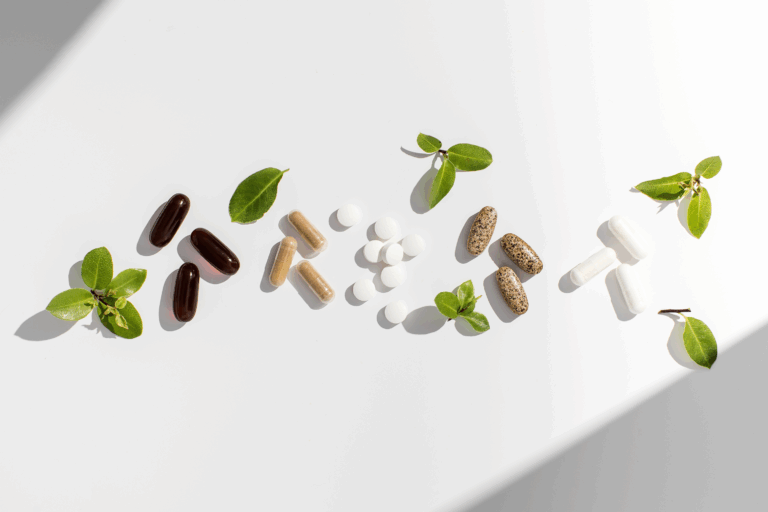What Makes a High Quality Protein Powder
Summary
Protein powders are a convenient way to add extra protein to the diet and are commonly used by athletes to enhance performance. Protein powder from plants and animals offer unique benefits that should be weighed based on daily requirements, personal goals, and other nutritional needs.
Protein is essential for the body. Dietary proteins are broken down into smaller pieces, called peptides, which are further degraded to individual amino acids, the building blocks of all proteins. In the body, amino acids are used to synthesize a variety of proteins in the body including hormones, enzymes, and organs, especially skeletal muscle.1 Dietary protein also stimulates muscle protein synthesis, the process required to increase muscle mass, especially when paired with resistance training.1 Protein can also increase feelings of satiety and slow the absorption of glucose, which may help limit food intake, stabilize blood glucose levels, and prevent unwanted weight gain.1
The average American should aim to consume 10 to 35 percent of their daily calories from protein, or approximately 0.8 g/kg of body weight per day (g/kg/d). Most people routinely meet or exceed this target.1 However, for some people, protein powder supplements can help increase protein intake to benefit overall health or to meet exercise goals.
Understanding Protein Powders
Protein powders are a supplemental form of protein that can help individuals reach the recommended intake for protein or achieve levels beyond that for the purposes of increasing muscle mass. They remain popular among athletes and active individuals, especially those who engage in resistance or strength training. Resistance training stimulates muscle growth, which naturally requires protein to build muscle mass.1 For individuals who tend to focus on endurance exercises, protein powders can help with muscle repair and increasing strength.1
In addition to athletes and highly active individuals, protein powders can be useful for people who struggle to consume enough protein or benefit from increased intake.2 While vegetarian and vegan individuals can obtain sufficient protein from the diet, protein powders can serve as a safety net to ensure proper intake. In elderly individuals, supplemental protein powder can help prevent age-related muscle loss and decreased muscle function. For individuals looking to alter their body composition by increasing lean mass and losing fat mass, protein powders can increase satiety and promote the accumulation of lean mass. Finally, for people who tend to skip a meal on a regular basis, protein powders can be a great way to include more protein in the diet despite limited opportunities.
Most protein powders, although not all, contain the nine essential amino acids (EAAs) that the body cannot make on its own. Some protein powders are also enriched with a group of essential amino acids called the branched-chain amino acids (BCAAs) that were discovered to be the driving force of the beneficial effects of protein powders on muscle mass. These amino acids – leucine, isoleucine, and valine – stimulate muscle protein synthesis and have important roles in neural function and blood glucose balance.1 The BCAA leucine is especially important in controlling muscle protein synthesis, with a dose-dependent relationship meaning the more leucine consumed, the more muscle protein synthesis (up to a point).1,2
Types of Protein Powders
There are several different types of protein powders, with unique advantages and limitations. Whey protein powder remains a popular option and is the most thoroughly researched protein powder; however, plant-based protein powders are becoming increasingly popular.
Animal-based protein powders
Whey and casein
Whey and casein are proteins found naturally in cow’s milk that separate when acid is added to milk.1 After being separated, whey and casein undergo filtration that increases their purity until the desired concentration is reached. Whey protein is water soluble, meaning it mixes easily with water, and it is rapidly digested.1 Casein on the other hand is not water soluble, resulting in coagulation in the gut during digestion, which slows its digestion.1
Both whey and casein contain relatively high levels of leucine, around 10 percent.1 Whey and casein are both considered complete proteins, meaning they provide all nine essential amino acids. However, individuals with dairy allergies, including to whey, casein, or other proteins found in milk such as alpha-lactalbumin and beta-lactoglobulin, should seek alternative options.3 Whey protein isolate contains the most protein and almost no lactose, which means individuals who are lactose sensitive may be able to consume with no issues.4
Whey and casein stimulate muscle protein synthesis, although whey is more effective.1 The amino acids found in whey also tend to survive the processes of digestion and absorption better, allowing more to reach the muscle where it can be imported and utilized to add to muscle mass.1 Whey also contains biologically active molecules that send messages throughout the body, enhance the immune response, improve sleep, and possess anti-bacterial, antiviral, and antioxidant properties.1,4,5
Plant-based protein powders
Soy
Soy, the most widely used and studied vegetable protein source, can stimulate muscle protein synthesis similar to whey and casein.1,4 It is considered a complete protein with a balanced profile of essential amino acids and similar protein quality scores compared to whey.4,6 However, soy contains lower amounts of BCAAs compared to milk and also lacks some of the important molecules found in whey protein that stimulate growth signals in the body.1 While soy protein may not be as high in leucine as whey protein, it contains higher levels of other important amino acids.7 For example, it has three times the amount of arginine, which is necessary for synthesis of nitric oxide and creatine and regulating immune function, and twice as much glycine, an amino acid involved in collagen synthesis.7
Scientific studies have reported conflicting information on soy protein powders likely due to differences in the people that were studied, the exercise protocol used, and the specific outcomes that were measured.2 In general, soy protein remains a safe and effective source of protein and, in the long term, may increase lean body mass and improve body composition.2 Individuals with a soy allergy should choose animal-based sources of protein or other plant-based protein powders.
Other plant-based proteins
Plant protein powders are becoming more popular, including those made from nuts, legumes, cereals, and pseudocereals.1,8 While plant-based proteins tend to score lower on protein quality rating scales, many real-world studies indicate that they can deliver comparable results to animal-based proteins, especially related to strength and body composition.2 For example, rice or pea protein resulted in gains in strength and muscle thickness, as well as improved body composition.9,10 It may also suppress pro-inflammatory pathways which may help reduce exercise-induced muscle damage.11 Potato protein is relatively high in essential amino acids and increased muscle protein synthesis in healthy young women.12,13 A trial with wheat protein revealed a similar extent of muscle protein synthesis as compared to whey protein powder, while use of peanut protein for 10 weeks resulted in increased muscle thickness.14,15 Finally, consumption of oat protein resulted in decreased muscle soreness and inflammatory markers after downhill running.16
Some animal sources of protein can have greater than ten percent leucine while plants tend to be in the six to eight percent range.12,17 This divide is not so large that it cannot be overcome by mixing various plant-based proteins, including from peas, brown rice, oat, and buckwheat flour. Plants with high leucine content include rice, peas, corn, and potato proteins as well as quinoa, chia, amaranth, and buckwheat as well as some blue-green and green algae.6 Increasing the dose can also compensate for the lower levels of amino acids and decreased digestibility; however, for some people this may be impractical.2
Plant-based protein powders can provide additional benefits due to the overall health-promoting effects of plants.4 Plant-based diets reduce the risk of developing cancer, type 2 diabetes, and cardiovascular diseases due to the presence of health-promoting phytonutrients found in plants.2,7 However, the compounds that benefit the body are also responsible for the lower digestibility of plant-based proteins. Some of these compounds are anti-nutritional factors, meaning they bind and inhibit digestion of other dietary compounds.2,4,6,7 For people seeking to simply add protein to their diet, lower digestibility is likely a non-issue. However, people with specific athletic or health goals may need to rely on plant-based proteins that contain more leucine and have greater digestibility.2
Overview of Animal- and Plant-based Protein Sources
| Protein Source | Protein Content | Digestibility | Highlights |
| Whey | High | Rapid and highly digestible | High in Leucine |
| Casein | Moderate | Moderate | Good source of EAAs |
| Soy | Moderate | Moderate | Effective and well-researched |
| Other Plants | Varies- low to moderate | Slower and lower digestibility | Similarly effective to whey and soy in initial research trials |
Key Characteristics of a Good Protein Powder
Protein Source
The source of the protein in a powder will dictate the quality of the protein, and as such, choosing the right protein source is very important. Protein quality can be measured in various ways with calculations that evaluate factors such as essential amino acid content, digestibility, utilization, and biological value.1,2 For strength-training athletes, the ability of a protein to stimulate muscle protein synthesis and muscle growth is likely the most important feature while runners may value proteins that can prevent or reduce muscle damage. For people seeking to increase protein intake overall, the specific metrics may not be as important. Choosing a high quality protein source can help provide the body with the best nutrients for growth and development and avoid the potential side effects of lower quality protein.
Because essential amino acids are critical to stimulating muscle protein synthesis, protein sources with more are considered to be higher quality.1 The concentration of essential amino acids in blood is also a major regulator of protein synthesis rates; therefore it is critical that protein sources contain all essential amino acids.1,2 Animal-based proteins, including dairy, tend to score higher and contain more essential amino acids.1 For individuals seeking plant-based options, consuming a mixed plant-based protein powder blend can provide all essential amino acids, although soy, brown rice, pea, corn, and potato protein meet requirements defined by the World Health Organization.1,2,12
Comparison of Protein Content of Some Plants vs. Whey12
| Protein Source | Protein Content (% raw material) | EAA Content (% of total protein) | Leucine Content (% of total protein) | Amount required to reach 2.7g Leucine (g) |
| Hemp | 51 | 23 | 5.1 | 105 |
| Corn | 65 | 32 | 13.5 | 31 |
| Potato | 80 | 37 | 8.3 | 41 |
| Whey | 72-84 | 43 | 11 | 32 |
Protein intake
For building or maintaining muscle mass, the recommended range of protein intake is 1.4 to 2.0 g/kg/d, which is significantly higher than the current RDA for protein.1 For those who engage in more intense resistance exercise, increasing the intake to 2.3 to 3.1 g/kg/d may be necessary.1 However, the optimal dose likely depends on factors that vary between each person, including age and type of exercise. Older individuals as well as those with intense workout regiments may require even more to optimize muscle protein synthesis.1 Protein powders should also contain 700 to 3000 mg of leucine in addition to other essential amino acids.1
Calculations of Protein Requirements by Body Weight
| Weight (kg) | Weight (lb) | RDA for protein (g/d) | Protein needs for active people (g/d) |
| 50 | 110 | 40 | 70-100 |
| 70 | 154 | 56 | 98-140 |
| 90 | 198 | 72 | 126-180 |
Some protein powders may contain significantly more protein than is necessary for reaching a specific health goal. Mega-doses of protein can impact the kidneys as they are responsible for processing and filtering amino acids from the blood; however, at regular doses, protein supplements are safe for almost all people.1 Conversely, some powders may not offer much protein per serving and will require multiple servings throughout the day. This can increase caloric intake and make it difficult to consume balanced meals in addition to the necessary protein powders. Checking the serving size and protein per serving can ensure a protein powder meets daily requirements.
Additional ingredients
Some protein powders contain added sugar which can exceed daily limits with just a few servings. Modest levels of glucose can stimulate insulin in the body which is a growth signal and can help with muscle mass gains.18 However, too much added sugar can cause an unhealthy spike in insulin levels which, over a long time, can contribute to insulin resistance and diabetes. Similarly, protein powders may contain artificial sweeteners in place of added sugars. However, research is conflicting on the safety and long-term consequences of various artificial sweeteners.19
Protein powder supplements may also contain other ingredients such as fillers or additives. While these may be generally recognized as safe by the FDA, they often lack the necessary research to definitively prove their safety. In order to truly ensure the product is pure and avoid unwanted side effects, consider choosing a protein powder that contains no fillers and additives. Additionally, some protein powders contain dangerous heavy metals and as such, choosing a reputable brand is very important.20
Other considerations
The degree of processing may be an important consideration for some individuals. Whey and casein require a great deal of processing to obtain isolated proteins, and these processes can remove beneficial ingredients such as minerals as well as denature immune boosting peptides, resulting in a protein powder with fewer benefits.1,4 Next, one should consider their preferred method of consuming protein powder. Some people prefer to mix the powder directly with water while others find that difficult to stomach and instead opt to blend protein powder into a smoothie. As such, the perceived mixability of a given protein powder will vary from person to person.
Measures of protein quality and calculations of protein content are important; however, they miss the biggest factor in choosing a good protein powder: personal preference. Whether it be personal taste, ethical positions, or environmental preferences, ultimately this should guide the decision-making process.2
Checking the Ingredient List
After determining the source of protein for a potential powder, look next to the ingredient list and supplement label. This will display the serving size, number of servings per container, protein and sugar content, as well as the presence of any additives, fillers, or artificial sweeteners. The ingredient list can help clarify what exactly is contained in the protein powder.
How to Use Protein Powders Effectively
Athletes should consume protein powders before working out or soon after completing a workout. Consuming protein before a workout ensures the body has the amino acids it needs when it begins to build muscle. Exercise also sensitizes muscles to take up and use amino acids more efficiently, which is why consuming a protein powder after a workout is also an effective option for exercise-related goals.1 Scientific studies have demonstrated that it is most advantageous to consume a moderate dose of protein (~20 grams) every three hours over the course of a day as opposed to large, less frequent doses or smaller doses more frequently.1 The timing and dose may need to be adjusted to accommodate individual preferences, nutrition intake, and exercise frequency.1
Examples of Common Foods and Their Protein Content
| Food | Protein per serving | Amount required for 20 grams protein |
| Banana | 1.3 g per medium banana | ~15 bananas |
| Oatmeal | 6 g per cup | ~ 3 cups |
| Greek yogurt | 17 g per container (170g) | 1.2 containers |
| Pumpkin seeds | 12 g per cup | 1.7 cups |
| Chia seeds | 4.7 g per oz | 4.3 oz |
For individuals seeking to increase protein intake for other reasons, consuming a protein powder beverage before going to bed may provide benefits. Consuming protein-rich beverages 30 minutes before sleep or two hours after dinner may benefit muscle protein synthesis, recovery from exercise, and metabolic health in both short- and long-term.21,22 It can also increase satiety and help meet the daily protein target and avoid choosing other, unhealthy foods before bed which can be problematic.21
Integrating protein powder into a balanced diet can significantly increase protein intake and positively affect metabolic and performance measures. Because protein powders do not contain important micronutrients or health-promoting compounds found in plants, they cannot fully replace consuming a healthy, balanced diet. For individuals who struggle to eat breakfast, replacing that meal with a mid-morning protein shake may be able to meet their needs while delivering important nutrients. Protein powder should be incorporated into a healthy eating plan that is balanced for nutrients and does not exceed caloric goals.
A good protein powder should contain high quality sources of protein and deliver them at the levels necessary to meet personal health goals, whether that be exercise-related or preventing declines in muscle function that naturally accompany aging. Sufficient essential amino acids, specifically leucine, should be present, and those seeking plant-based proteins may need to select a blend of plant sources of protein in order to ensure adequate leucine content. Proteins are involved in nearly every bodily process in one form or another, which is why choosing a protein powder wisely is so important; it can impact health at the cellular level all the way up to whole-body health.
- Jäger, R., Kerksick, C.M., Campbell, B.I., Cribb, P.J., Wells, S.D., Skwiat, T.M., et al. (2017). International Society of Sports Nutrition Position Stand: protein and exercise. J Int Soc Sports Nutr, 14:
- Kerksick, C.M., Jagim, A., Hagele, A., Jäger, R. (2021). Plant Proteins and Exercise: What Role Can Plant Proteins Have in Promoting Adaptations to Exercise? Nutrients, 13:
- Zhang, Z., Ma, R., Xu, Y., Chi, L., Li, Y., Mu, G., Zhu, X. (2022). Investigation of the Structure and Allergic Potential of Whey Protein by Both Heating Sterilization and Simulation with Molecular Dynamics. Foods, 11(24):
- Hoffman, J.R., Falvo, M.J. (2004). Protein- Which is Best? J Sports Sci Med, 3(3):
- da Rosa Camargo, L., Doneda, D., Oliveira, V.R. (2020). Whey protein ingestion in elderly diet and the association with physical, performance and clinical outcomes. Exp Gerontol, 137:
- Nichele, S., Phillips, S.M., Boaventura, B.C.B. (2022). Plant-based food patterns to stimulate muscle protein synthesis and support muscle mass in humans: a narrative review. Appl Physiol Nutr Metab, 47:
- Hertzler, S.R., Lieblein-Boff, J.C., Weiler, M., Allgeier, C. (2020). Plant Proteins: Assessing Their Nutritional Quality and Effects on Health and Physical Function. Nutrients, 12:
- Langyan, S., Yadava, P., Khan, F.N., Dar, Z.A., Singh, R., Kumar, A. (2022). Sustaining Protein Nutrition Through Plant-Based Foods. Front Nutr, 8:
- Joy, J.M., Lowery, R.P., Wilson, J.M., Purpura, M., De Souza, E.O., Wilson, S.M., Kalman, D.S., Dudeck, J.E., Jäger, R. (2013). The effects of 8 weeks of whey or rice protein supplementation on body composition and exercise performance. Nutr J, 12:86.
- Wang, Z., Liang, M., Li, H., Cai, L., Yang, L. (2019). Rice Protein Exerts Anti-Inflammatory Effect in Growing and Adult Rats via Suppressing NF-kB Pathway. Int J Mol Sci, 20(24):6164.
- Gorissen, S.H.M., Crombag, J.J.R., Senden, J.M.G., Huub Waterval, W.A., Bierau, J., Verdijk, L.B., van Loon, L.J.C. (2018). Protein content and amino acid composition of commercially available plant-based protein isolates. Amino Acids, 50(12):
- Oikawa, S.Y., Bahniwal, R., Holloway, T.M., Lim, C., McLeod, J.C., McGlory, C., Baker, S.K., Phillips, S.M. (2020). Potato Protein Isolate Stimulates Muscle Protein Synthesis at Rest and with Resistance Exercise in Young Women. Nutrients, 12:1235.
- Pinckaers, P.J.M., Kouw, I.W.K., Hendriks, F.K., van Kranenburg, J.M.X., de Groot, L., Verdijk, L.B., Snijders, T., van Loon, L.J.C. (2021). No differences in muscle protein synthesis rates following ingestion of wheat protein, milk protein, and their protein blend in healthy, young males. Br J Nutr, 126(12):1832.
- Lamb, D.A., Moore, J.H., Smith, M.A., Vann, C.G., Osburn, S.C., Ruple, B.A., Fox, C.D., Smith, K.S., Altonji, O.M., Power, Z.M., Cervosky, A.E., Ross, C.O., Cao, A.T., Goodlett, M.D., Huggins, K.W., Fruge, A.D., Young, K.C., Roberts, M.D. (2020). The effects of resistance training with or without peanut protein supplementation on skeletal muscle and strength adaptations in older individuals. J Int Soc Sports Nutr, 17:66.
- Xia, Z., Cholewa, J.M., Dardevet, D., Huang, T., Zhao, Y., Shang, S., Yang, Y., Ding, X., Zhang, C., Wang, H., Liu, S., Su, Q., Zanchi, N.E. (2018). Effects of oat protein supplementation on skeletal muscle damage, inflammation, and performance recovery following downhill running in untrained collegiate men. Food Funct, 9(9):4720.
- van Vliet, S., Burd, N.A., van Loon, L.J.C. (2015). The Skeletal Muscle Anabolic Response to Plant-versus Animal-Based Protein Consumption. J Nutr, 145(9):1981.
- Dimitriadis, G., Mitrou, P., Lambadiari, V., Maratou, E., Raptis, S.A. (2011). Insulin effects in muscle and adipose tissue. Diabetes Res Clin Pract, 93 Suppl 1:
- Sharma, A., Amarnath, S., Thulasimani, M., Ramaswamy, S. (2016). Artificial sweeteners as a sugar substitute: Are they really safe? Indian J Pharmacol, 48(3):237.
- Bandara, S.B., Towle, K.M., Monnot, A.D. (2020). A human health risk assessment of heavy metal ingestion among consumers of protein powder supplements. Toxicol Rep, 7:
- Kinsey, A.W.., Ormsbee, M.J. (2015). The Health Impact of Nighttime Eating: Old and New Perspectives. Nutrients, 7(4):
- Trommelen, J., van Loon, L.J. (2016). Pre-sleep protein ingestion to improve the skeletal muscle adaptive response to exercise training. Nutrients, 8:12.







